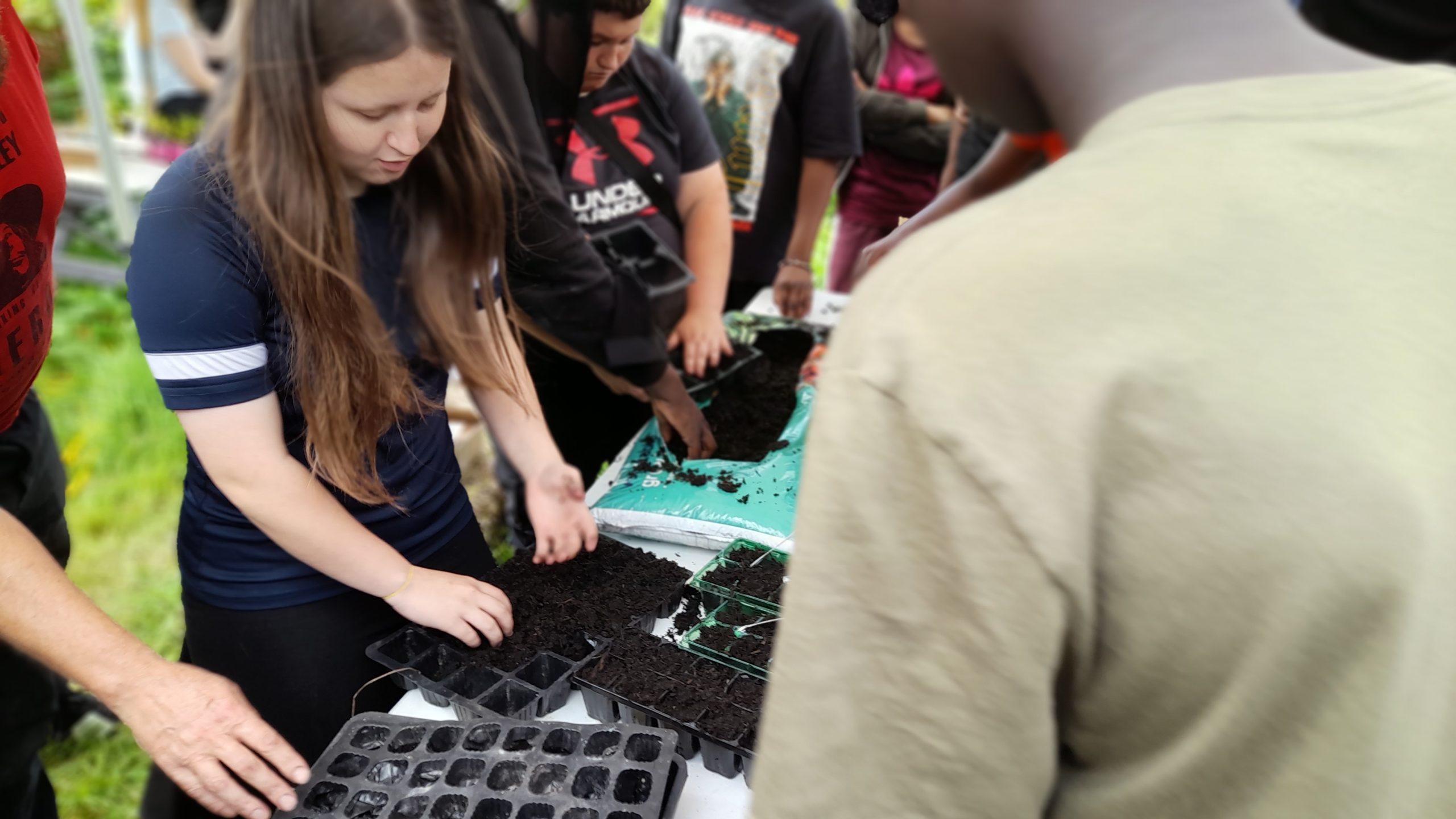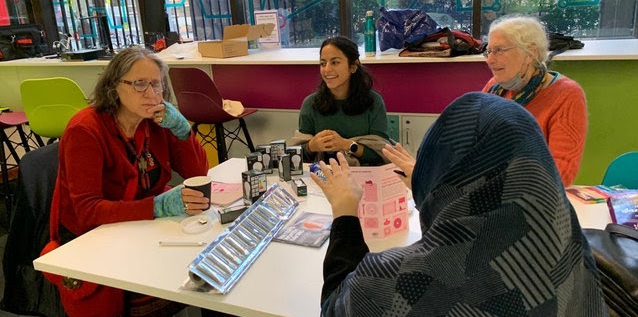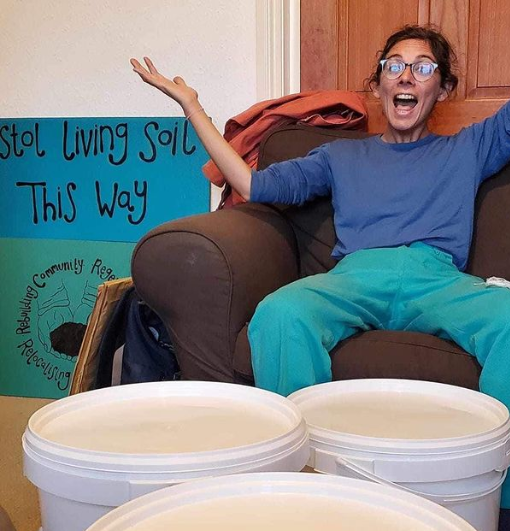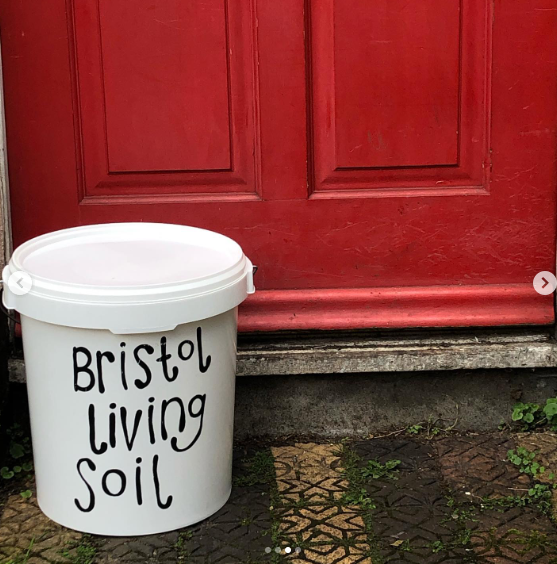How seed funding nourishes community action

19 October 2023
8 minute read
It’s the moment we’ve been waiting for – launching our latest seed funding grants to help Transition groups unlock wonderful things in your communities.
Thanks to National Lottery players and the National Lottery Community Fund, a total of £270,000 will be distributed to support your community-led work for change, in our largest round yet.
As we move towards the end of this phase of our project and plan for the future, it’s important to be aware that this is the last round of grants for which we have confirmed funding at this stage.
Unlocking change in your community
Registered Transition groups across England, Wales and now also Northern Ireland are eligible to apply (In Scotland, check out current funding from Scottish Communities Climate Action network.)
Throughout 2023, 70 projects supported by our last round of grants have been doing amazing things: building alternative systems for food, energy and transport; unlocking new creative solutions and growing community connections. As you consider making an application, there is no better inspiration.
Perhaps you can see the potential in a local space – outdoors, like Grow Lewisham which turned a neglected concrete area into a new public square for local people to connect – or indoors, like Sustainable St Albans, working with the local community to design a town centre hub for local action.
Maybe, like Transition Wilmslow, you have a vision for a thriving local food system. They ran “Plot to Plate” with local families, harvesting and cooking food from their community gardens and took a stall at the town’s artisan food market to sell their own produce for the first time – customers were queuing up!
As energy bills soared, many groups took practical action to help people respond. Think & Do rolled out their energy savers club across 5 Camden estates, working with 300 households to cut their energy use and bills. The experience, they said, has “reinforced our belief that a project which is co-designed and delivered by residents, for residents, is so much better than a top down approach.” Transition Town Ilford found another grassroots solution: running a fortnightly energy cafe in the local library, where they could reach right across the community with their tailored advice and information.

If you dream of a thriving, regenerative local economy, take inspiration from Owned by Oxford, building a community retrofit project on the Barton estate. It will grow jobs, skills and a long-term, local solution to cold, leaky homes which also builds community wealth. Bolton Diggers ran a series of workshops in ‘Skills for an alternative economy’ with diverse participants from across their borough. Transition groups in Crich, Crowborough, Kew and Buxton all developed sharing and repairing in their communities, reducing waste and consumption, while Transition Bookham progressed with plans to become a plastic free community.
Transition groups can have an impact far beyond their size, scale and resource – and we’ve been amazed at what you can do with just a small pot of money.
Community Roots Permaculture Project received a grant of £500 and engaged more than 80 families on their estate, planting fruit trees and bushes in their gardens for a source of fresh, local, healthy food for years to come.
Transition Chipping Norton also received a microgrant of £500 to start some youth meet ups in the park. They connected with the town’s councillors, and together the young people designed a new play park (opened this summer), events and new paths. Now their young activists believe they have a say in the future of their town.
Deep roots and unexpected fruits
The Transition approach allows new directions, opportunities and relationships to emerge. Projects which on the face of it seem simple and purely practical can be delivering profound changes in mindsets and connections below the surface. Because Transition groups are embedded in their community; because you leave space to listen to and learn from many partners and people, the impact of your work can go wider and deeper than even you anticipated.
Transition Woodbridge’s local food project connected them with 134 local food producers, who were included in a pamphlet. Dan from the team reflected: “The aim is not to publish a leaflet; it’s to deepen connections with who and where our food comes from.”
Transition Eynsham provided training for community transport drivers in an effort to improve connections in their rural area. One of the organisers told us how profoundly it’s transforming rural isolation: “It’s been five and a half years of lockdown and you’ve given us back our life.”
Planet Cheltenham develop their youth group and run an active hope workshop to help navigate climate anxiety. One participant said: ‘This group is the only thing that gives me hope’.


Coexist’s Bristol Living Soil project is about much more than compost. By setting up the city’s first compost collective, they are involving people in regenerating soils, food systems and reconnecting community – and their vision is of similar projects right across Bristol. They said: “Without this funding we wouldn’t have been able to secure the compost tumblers, and therefore earn the trust to get a space agreement in place. The funding has been genuinely transformational.”
What can be funded
Once again, there are three types of grants. Microgrants of £100-£500 have a quick and simple application process, but can still make a big impact for your group and your neighbourhood.
Full grants up to £5,000 could help you try something new or take the next step towards your vision for community-led change. Tell us how your plans will grow collaborations, be accessible and contribute to building a just transition in your local community.
Partnership grants up to £10,000 allow two or more Transition groups to work together on a common theme or place, generating more impact and reach than one group could achieve on its own.
A new Friends of the River Exe organisation emerged from a partnership grant awarded to Sustainable Tiverton, Transition Exeter and Transition Exmouth last time round. By working together, they were able “to create a really amazing project which everyone is talking about, harnessing the outrage which people feel about pollution in our rivers to give a voice to nature, cutting through the bureaucratic noise from water companies and government agencies”
The funding is flexible, and a range of different costs could be eligible: from events and equipment costs to developing infrastructure, producing material or websites to providing training, from rent or bills to staff or freelance capacity. What’s important is your vision for how this funding can help unlock change in your community.
Sustaining the work of change
We know community organising is not always about a new shiny project; sometimes the key to sustaining real impact is strengthening your core, growing your capacity and deepening what you are already doing.
After a challenging few years for community action, grants helped to reignite several groups, including Worchester and Walthamstow. Sustainable Tring held two Citizen’s Assembly meetings to bring together different groups in the town: “Through this we’ve massively increased engagement, changed our name, started/restarted action groups and taken on other activities.”
Seed funding has helped Transition groups to diversify and extend beyond their existing networks. After a community survey, Usk Together for the Climate gave leadership of their headline summer event to local young people. Transition Chesterfield used a micro grant to reach out to new audiences, including taking a stall at Chesterfield Pride this summer. Transition groups in Wellington and Liverpool were able to revamp websites and create publicity materials or events to raise their profile and invite new people to join in.
Transition Buxton new Library of Things has brought younger volunteers onboard and brought them into collaboration with local projects providing support for long term unemployed and setting up a community workshop space.
Perhaps this is the moment to turn interest in Transition in your community into action? In March, Carmarthen Together used a seed funding grant to launch their new Transition group, with a children’s climate conference, a bilingual website and an evening celebration bringing together 15 community projects. Now they have contacts with their local and county councils, and are exploring a physical hub, as a result of a contact made at that launch event: “Gaining this much exposure would have taken us so much longer if we hadn’t been able to create such a splash,” they said.
All of this is building infrastructure, it’s about people and connection, and working together towards the kind of world we want to live in. A seed funding grant could allow you to take the next step forward and open up new, unforeseen possibilities for change – where will you go?